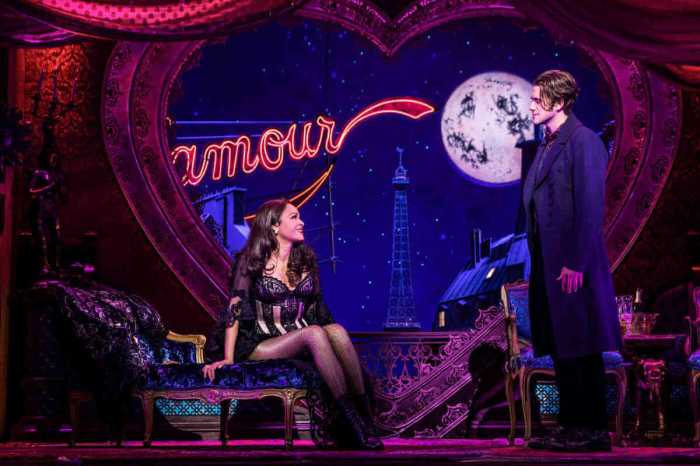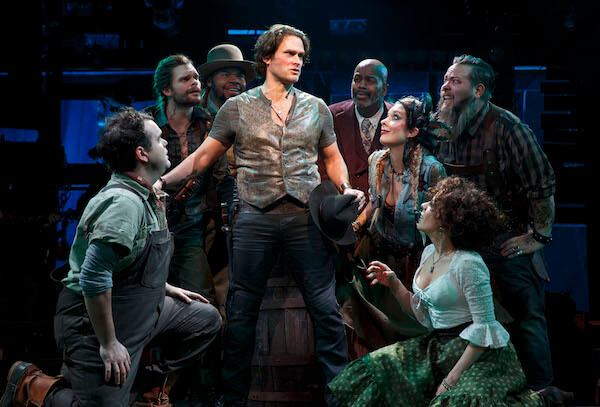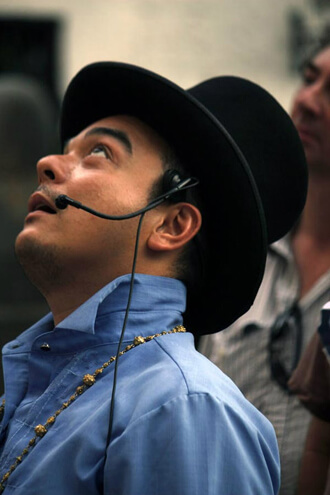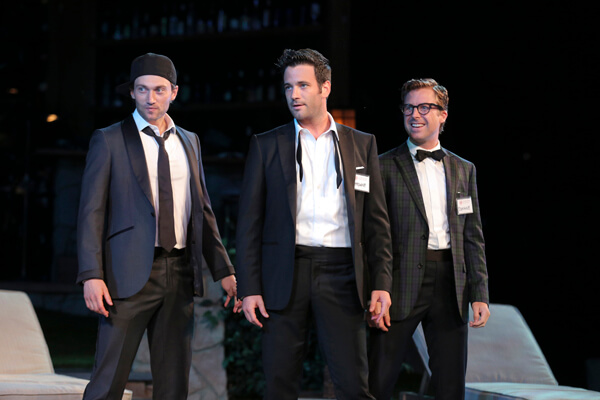Ruthie Ann Miles as Imelda Marcos in David Byrne andFatboy Slim’s “Here Lies Love.” | JOAN MARCUS
BY CHRISTOPHER BYRNE | The sheer exuberance of the groundbreaking musical “Here Lies Love” at the Public could easily blind one to its deeper intelligence and extraordinary artistry. The tale of Imelda Marcos’ rise from country beauty on Leyte, a small island in the Philippines, to international celebrity and then her exile to the US would at first blush seem like “Evita of the Pacific Rim.”
But its structure and the immersive experience it creates push the musical form into an emotional and theatrical space that, like “Fun Home,” at the Public last year, has a powerful, visceral immediacy.
The 90-minute show by David Byrne and Fatboy Slim is set in a disco and sung-through. Most of the audience members stand, move, and dance in the middle of the floor, while the action takes place around them. David Korins has designed an ingenious collection of platforms, including a center stage that is constantly moved and extended by a group of stagehands who are as important to the experience as the cast. While the action focuses on the singing and dancing, projections by Peter Nigrini provide the real-life context for the events.
“Here Lies Love” brilliantly chronicles Imelda Marcos’ life, pushes theatrical boundaries
The actors sing to tracks, much as performers did in discos in the 1980s, and the feeling is consistently celebratory, even as we see the dark political machinations of Ferdinand and Imelda Marcos that led to the People Power Revolution and their exile in Hawaii.
It is in the tension between frivolity and corruption that the show transcends traditional musical theater. Because the audience is up on their feet dancing along with the company, it’s easy to feel the emotionalism that allows a corrupt regime to take and keep power. Swept along in this irresistible tide, the audience becomes unintentionally complicit in events that ultimately undermined the Filipino people’s welfare and drowned out dissident Ninoy Aquino’s until it was too late. To mash up an historical cliché, the audience dances while the Philippines burns.
The urge to dance is understandable. Byrne and Slim’s score is an infectious blend of pop and disco. Fans of Byrne’s work will recognize some signature harmonics, but the two men are faithful to the sounds of the era even as they create original music that never stoops to pastiche. And the score works theatrically to bring the narrative to a moving conclusion.
I first saw this show when it opened last year, prior to its current open-ended run. On a second viewing, the emotional impact is undiminished.
Alex Timbers continues to be one of the most exciting directors working in theater today. The movement and energy are brilliantly focused, even as the action swirls around the audience members, as if he were able to anticipate how they would serve as characters. Annie-B Parson’s choreography is inspired.
The cast, too, is outstanding. Jose Llana is charismatic and compelling as Marcos. Conrad Nicomora has a quiet passion as Ninoy Aquino, characterizing him in stark contrast to the Marcoses. Ruthie Ann Miles is spectacular as Imelda, with a vocal technique that ages subtly as her character does. It’s easy to believe Imelda never intended to be a villain but, like so many before her, let power and glitter blind her to the devastating consequences of her actions.
In considering the significance of this show and others such as “Sleep No More” — an involving and abstracted “Macbeth” that was part show, part art installation — it’s inspiring to recognize the number of artists who are playing with traditional forms. As the options for video entertainment have grown exponentially, theater is pushed to reinvent itself to capitalize on elements only a live experience can deliver — including intimacy and immediacy. To be sure, one need only see Tyne Daly in “Mothers and Sons” or Reed Birney in “Casa Valentina” to be reminded of the power of traditional theater. But “Here Lies Love” is proof that theater continues to be an extraordinarily dynamic art form.
HERE LIES LOVE | The Public Theater | 425 Lafayette St., btwn. E. Fourth St. & Astor Pl. | Mon.-Fri. at 8 p.m.; Sat. at 5 & 9:30 p.m.| Sun. at 3 & 7:30 p.m. | $119-$130; publictheater.org or 212-967-7555 | 90 minutes, no intermission
Editor's note: An earlier version of this post mistakenly indicated that “Sleep No More” had recently closed. That show remains open.



































